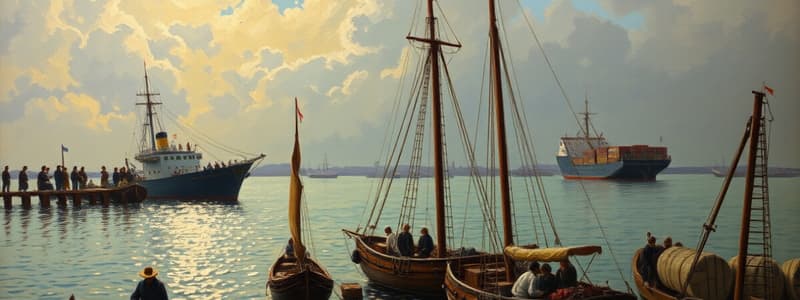Podcast
Questions and Answers
Which technology is primarily responsible for enhancing the tracking of cargo in real-time?
Which technology is primarily responsible for enhancing the tracking of cargo in real-time?
- IoT (Internet of Things) (correct)
- Cybersecurity measures
- Artificial Intelligence
- Blockchain Technology
What is a significant environmental advantage of using LNG and hydrogen in shipping?
What is a significant environmental advantage of using LNG and hydrogen in shipping?
- Limited range of travel
- Increase in fossil fuel dependency
- Higher operational costs
- Reduction of emissions (correct)
How has climate change influenced global shipping routes?
How has climate change influenced global shipping routes?
- By making the Arctic route more navigable (correct)
- By reducing shipping capacity overall
- By increasing piracy in affected areas
- By making the Panama Canal obsolete
What are the implications of emerging markets, such as Africa, on maritime transport?
What are the implications of emerging markets, such as Africa, on maritime transport?
Which of the following trade agreements is known to significantly affect maritime trade flows?
Which of the following trade agreements is known to significantly affect maritime trade flows?
What is a key cybersecurity concern for shipping companies?
What is a key cybersecurity concern for shipping companies?
How do stricter international environmental regulations affect shipping operations?
How do stricter international environmental regulations affect shipping operations?
What has been a notable effect of global crises like COVID-19 on shipping?
What has been a notable effect of global crises like COVID-19 on shipping?
Flashcards are hidden until you start studying
Study Notes
Impact of Technology
-
Automation and Digitalization:
- Use of AI and machine learning for logistics optimization.
- Autonomous vessels and drones for shipping and delivery.
- Enhanced tracking systems (IoT) for real-time cargo monitoring.
-
Sustainability Innovations:
- Development of eco-friendly vessels powered by alternative fuels (e.g., LNG, hydrogen).
- Implementation of energy-efficient technologies to reduce emissions.
-
Blockchain Technology:
- Increased transparency and security in shipping documentation.
- Streamlined supply chain processes, reducing fraud and delays.
-
Cybersecurity Risks:
- Growing threat of cyberattacks on shipping companies and ports.
- Necessity for robust cybersecurity measures to protect data and operations.
Global Trade Patterns
-
Shift in Trade Routes:
- Changing shipping lanes due to geopolitical tensions (e.g., South China Sea).
- The impact of the Arctic route becoming more navigable due to climate change.
-
Impact of Trade Agreements:
- Influence of treaties (like RCEP, USMCA) on maritime trade flows.
- Tariff changes affecting container shipping rates and patterns.
-
Regional Trade Dynamics:
- Growth of intra-Asian trade and its implications for global shipping.
- Emerging markets (e.g., Africa) increasing demand for maritime transport.
-
Supply Chain Disruptions:
- Effects of global crises (e.g., COVID-19) on shipping capacity and delays.
- Shift towards nearshoring and reshoring affecting traditional trade routes.
-
Environmental Regulations:
- Stricter international policies (e.g., IMO 2020) influencing shipping operations.
- Compliance costs affecting global shipping competitiveness and trade patterns.
Impact of Technology
-
Automation and Digitalization:
- AI and machine learning enhance logistics by optimizing routes and reducing costs.
- Autonomous vessels and delivery drones revolutionize shipping efficiency and safety.
- IoT-enabled tracking systems provide real-time cargo monitoring, improving transparency.
-
Sustainability Innovations:
- Eco-friendly vessels using alternative fuels like LNG and hydrogen are being developed.
- Energy-efficient technologies are adopted to minimize greenhouse gas emissions.
-
Blockchain Technology:
- Boosts transparency and security in shipping documentation, reducing risks of fraud.
- Streamlines supply chain processes, leading to faster and more reliable operations.
-
Cybersecurity Risks:
- Shipping companies and ports face increasing cyberattack threats, endangering data security.
- Strong cybersecurity measures are essential to safeguard data and business operations.
Global Trade Patterns
-
Shift in Trade Routes:
- Geopolitical tensions, especially in the South China Sea, alter established shipping lanes.
- Climate change enhances accessibility of the Arctic route, creating new maritime opportunities.
-
Impact of Trade Agreements:
- Treaties like RCEP and USMCA significantly influence maritime trade flows.
- Changes in tariffs impact container shipping rates and the movement of goods.
-
Regional Trade Dynamics:
- Intra-Asian trade is accelerating, affecting global shipping strategies and capacity.
- Emerging markets, particularly in Africa, are seeing rising demand for maritime transport.
-
Supply Chain Disruptions:
- Global crises, such as COVID-19, have led to significant shipping capacity limits and delays.
- Increasing trends towards nearshoring and reshoring disrupt traditional trade routes.
-
Environmental Regulations:
- Stricter international policies, like IMO 2020, impose regulations on shipping emissions.
- Compliance costs under these regulations impact global shipping competitiveness and trade dynamics.
Studying That Suits You
Use AI to generate personalized quizzes and flashcards to suit your learning preferences.




